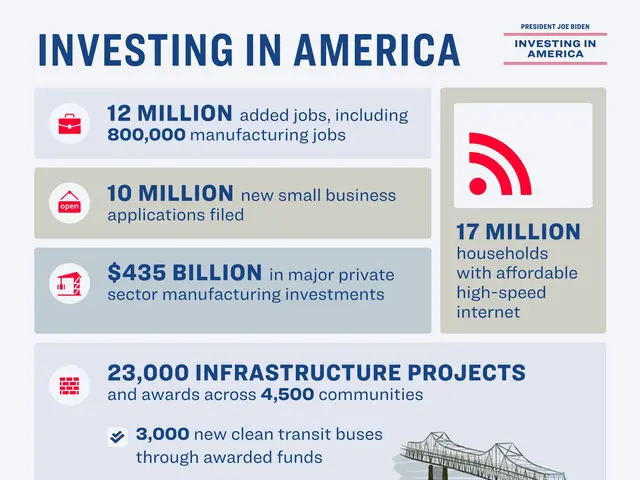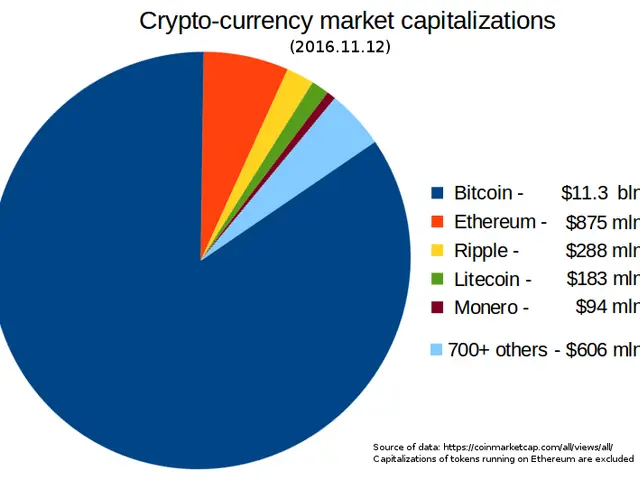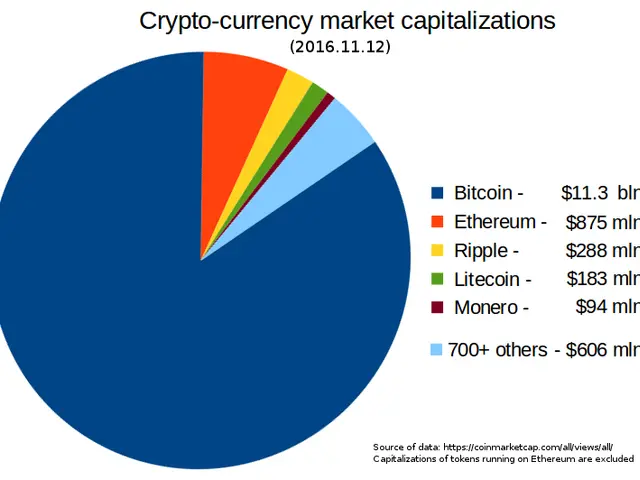GOP Members Unveil Cryptocurrency Legislation Intended to Limits Dominance of Major Corporations and Divide Oversight between SEC and CFTC
Here's a fresh take on the article:
Wallop! Republican lawmakers from the House Committee on Financial Services and the House Committee on Agriculture are shaking things up in the crypto world. They've dropped a hot new bill in the Senate - a comprehensive regulatory framework for digital assets - and it's causing quite the stir!
I'll Spill the Beans
The new crypto bill, crafted by Chairmen French Hill, G.T. Thompson, Bryan Steil, and Dusty Johnson, draws inspiration from the Financial Innovation and Technology for the 21st Century Act (FIT21), which swept through the House back in 2024. The draft aims to address long-standing concerns over market concentration while fostering innovation and consumer protection.
Taking Aim at Big Dogs
May 5 marked the grand unveiling of the 212-page discussion draft. This bad boy aims to reduce the influence of large crypto firms by lowering the threshold for defining an 'affiliated person' from 5% to 1%.
"The term 'affiliated person' means a person (including a related person) that, with respect to any digital commodity - (A) acquires more than 1 percent or more of the total outstanding units of such digital commodity from a digital commodity issuer," the bill reads.
This move is intended to promote broader participation in the market by giving smaller players a chance to get their paws on the action. Justin Slaughter, VP of Regulatory Affairs at Paradigm, weighed in, "This bill makes clear the regulatory regime proposed is going to push against that fact and strongly encourage more small-d 'democratization' of the space."
Now, You're Cooking with Gas (and Digital Assets)
The bill also establishes requirements for affiliated or related persons involved in digital commodities. These individuals must hold the commodity for at least 12 months from receiving it before the blockchain system associated with the digital commodity is certified as mature. They're also regulated in their transactions, limited to 5% of their holdings or 1% of the average weekly trading volume in any 3-month period. Sales must occur through a digital commodity exchange, and the commodity must be used within the functioning of the blockchain system.
As the blockchain system becomes certified as mature, the holding period reduces to 3 months, and the transaction limit lowers to 1% of the total outstanding units or 1% of the average weekly trading volume. The intention is to prevent market manipulation and ensure fairness in digital commodity transactions.
The Crypto Clash of Titans: SEC and CFTC
The discussion draft also sheds light on the jurisdictional divide between the Securities and Exchange Commission (SEC) and the Commodity Futures Trading Commission (CFTC). This will allow digital asset projects to develop under well-defined and distinct sets of rules for securities and commodities.
"Digital asset developers will have a pathway to raise funds under the SEC's jurisdiction. Market participants will have a clear process to register with the CFTC for digital commodity trading," the draft's one-pager noted.
Finally, the draft prioritizes public and permissionless blockchains, explicitly defining them as the focus of the legislation. Private or permissioned networks may not qualify, aligning with the bill's emphasis on decentralized systems.
Crypto Carnival: Coming Up Next!
The legislation also permits airdrops - broad, equitable token distributions - under specific conditions. After establishing these foundational principles, disclosure requirements and procedures for registering digital commodity exchanges follow. This bill is creatures comfort: it aims to provide regulatory clarity that the crypto market has been longing for!
Going Forward
The digital assets subcommittees of both House committees are set to meet for a joint hearing on May 6. As digital assets gain mainstream acceptance, this legislation could set a precedent for global regulatory standards, ensuring trust and stability in the market.
To close the loop, the new bill marks a significant stride towards regulating the crypto industry. Potential amendments are on the table before a House vote. With clear rules in place, it's up to all digital asset enthusiasts to ensure the crypto world remains a wild and vibrant frontier!
- The new crypto bill, inspired by the Financial Innovation and Technology for the 21st Century Act (FIT21), seeks to address long-standing concerns over market concentration while fostering innovation and consumer protection.
- May 5 saw the unveiling of a 212-page discussion draft aimed at reducing the influence of large crypto firms by lowering the threshold for defining an 'affiliated person' from 5% to 1%.
- This bill, supported by Justin Slaughter, VP of Regulatory Affairs at Paradigm, aims to promote broader market participation by giving smaller players a chance to participate.
- The bill also establishes requirements for affiliated or related persons involved in digital commodities, including a 12-month holding period and transaction limitations.
- As the blockchain system becomes certified as mature, the holding period reduces to 3 months, and the transaction limit lowers.
- The bill sheds light on the jurisdictional divide between the Securities and Exchange Commission (SEC) and the Commodity Futures Trading Commission (CFTC), allowing digital asset projects to develop under well-defined sets of rules.
- The legislation permits airdrops under specific conditions and follows with disclosure requirements and procedures for registering digital commodity exchanges.
- On May 6, the digital assets subcommittees of both House committees are set to meet for a joint hearing, potentially setting a precedent for global regulatory standards in the crypto market.
- With clear rules in place, digital asset enthusiasts have the opportunity to ensure the crypto world remains a wild and vibrant frontier, staying ahead of potential amendments and regulation before a House vote.







